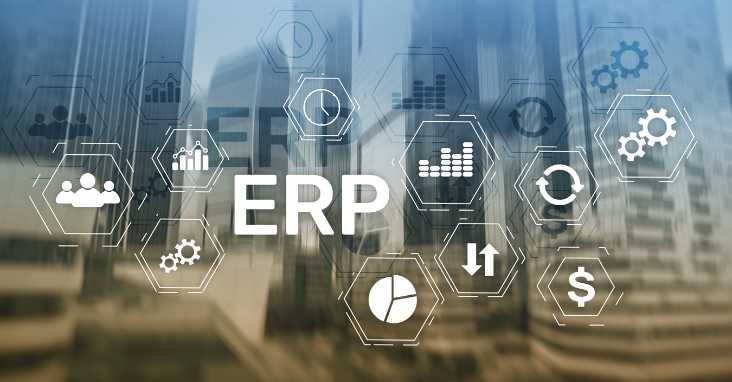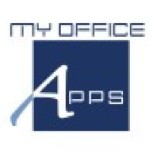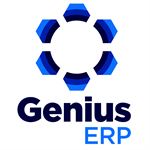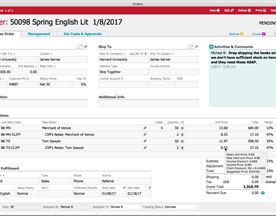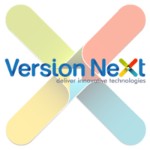Are you curious about ERP systems? Maybe you’ve heard the term thrown around in business meetings or stumbled upon it in articles. But what exactly are they We will see some ERP systems examples?
Simply put, most ERP software (Enterprise Resource Planning) systems are software that help businesses manage and integrate important parts of their operations.
But, it’s more than just a definition, right? It’s about understanding how these systems can change the game for small businesses everywhere, big and small. Keep reading for useful ERP system examples and what to know when selecting one
Now, you might be wondering, why are we talking about ERP systems? Well, in today’s fast-paced business environment, staying on top of every aspect of your company is crucial. That’s where ERP systems come into play. They’re not just fancy software; they’re tools that help businesses streamline and streamline business processes, improve customer satisfaction and efficiency, and make better decisions. Sounds pretty essential, right?
The Evolution of ERP Systems
Let’s take a brief trip down memory lane. ERP systems have evolved from simple accounting software to complex, integrated solutions managing everything from inventory management to production planning to human resource management and resources to capital management and resources. It’s fascinating how they’ve grown to become the backbone of many businesses.
Why ERP Systems?
So, why should you care about ERP systems? Imagine having a system that has financial data, human resources, capital management, and financial reporting, gives you a 360-degree view of your business, helps you identify inefficiencies, and provides insights for growth. That’s what ERP systems offer. They’re like the Swiss Army knife for businesses, providing tools for various needs.
The Impact of ERP Systems on Businesses
ERP systems have transformed the way small businesses can operate. They break down silos, enhance communication, streamline business processes and provide a unified platform for decision-making. We’re talking about a level of organization and efficiency that can be a real game-changer.
ERP Systems Across Industries
It’s not just about manufacturing or retail. ERP systems have made their mark across various industries, from healthcare to education. This versatility shows how adaptable and essential these data management systems are.
Now, buckle up as we dive deeper into the world of ERP systems, exploring examples, benefits, and how they can revolutionize your business.
Summary: ERP systems are essential tools that help businesses manage operations, improve efficiency, reduce costs, and make better decisions. They have evolved over the years and are now vital in various industries.

History and Evolution of ERP Systems
When we talk about ERP (Enterprise Resource Planning) systems, it’s not just about the software you see today. It’s a story that starts from the very basics of business computing and evolves into the multifaceted platforms we know now. Let’s take a stroll down memory lane and see how ERP systems have transformed over the years.
The Humble Beginnings: 1960s-1970s
- Early Days of Computing: The history of ERP begins in the 1960s with the birth of basic management information systems. Back then, businesses used simple computer systems primarily for payroll and basic bookkeeping.
- Focus on Inventory Management: In the 1970s, the concept evolved into MRP (Material Requirements Planning) systems. These systems were groundbreaking for their time, focusing on inventory control and manufacturing processes.
The Expansion Era: 1980s
- MRP to MRP II: The 1980s saw the transition from MRP to MRP II (Manufacturing Resource Planning). MRP II systems offered a broader range of capabilities, including more detailed scheduling and planning tools.
- Integration of More Business Processes: This era marked the beginning of integrating other business processes like procurement, project management, and human resources into these systems.
The Birth of ERP: 1990s
- Introduction of ERP: The term ERP was first coined in the 1990s. It represented a new phase where systems integrated all core processes needed to run a company into one complete system.
- Technological Advancements: The rise of the internet and improvements in database management systems played a crucial role in the expansion of ERP capabilities.
The New Millennium: 2000s and Beyond
- Web-Based Applications: With the advent of the internet, ERP systems transitioned from being primarily on-premises to being available as web-based applications. This shift made ERP systems more accessible and flexible.
- Integration of Advanced Technologies: The 2000s also witnessed the integration of advanced technologies like cloud computing, making ERP systems more scalable and cost-effective.
The Present and Future: Cloud Computing and AI
- Cloud ERP Systems: Today, cloud-based ERP systems are prevalent. They offer the advantages of being more scalable, less expensive upfront, and accessible from anywhere.
- Artificial Intelligence (AI) and Machine Learning: Modern ERP systems are beginning to incorporate AI and machine learning, offering predictive analytics and smarter data processing.
Reflecting on the Journey
Looking back, it’s clear that the evolution of ERP systems is closely tied to advancements in technology. From basic inventory management and warehouse management to supply chain management to AI-integrated solutions, ERP systems have grown to become not just a business tool but a strategic partner in driving efficiency and innovation.
Summary: The evolution of ERP systems from simple inventory management, supply chain management, operations and production planning tools in the 1960s to today’s AI-integrated, cloud-based platforms reflects technological advancements and changing business needs. These systems have grown to encompass all core business processes, offering more than just efficiency but strategic value and customer satisfaction.

Software Tools for ERP
In the vast landscape of ERP systems, there’s a diverse array of software tools designed to cater to different business needs and goals. Let’s expand our view and delve deeper into some of the notable best ERP systems examples and software tools available in the market, exploring their unique features and why they might be the perfect fit for your business.
1. SAP ERP
- Key Features: Known for its comprehensive and robust capabilities, SAP ERP offers modules for nearly every aspect of business management, including finance, HR, manufacturing, and supply chain.
- Best For: Large enterprises with complex, global operations that require a high degree of customization and scalability.
- Unique Selling Point: SAP’s powerful analytics and reporting tools provide deep insights, helping businesses make data-driven decisions.
2. Oracle NetSuite
- Key Features: This cloud-based solution offers real-time data visibility and a suite of applications for ERP, CRM, PSA, and e-commerce.
- Best For: Businesses of all sizes, particularly those looking for a scalable, cloud-native solution with a strong focus on financial management.
- Unique Selling Point: NetSuite’s flexibility and ease of use, coupled with powerful cloud infrastructure, make it a top choice for growing businesses.
3. Microsoft Dynamics 365
- Key Features: A combination of ERP and CRM capabilities, integrated with Microsoft’s productivity tools and AI-driven insights.
- Best For: Organizations seeking a comprehensive, all-in-one business solution that integrates seamlessly with other Microsoft products.
- Unique Selling Point: Dynamics 365’s strong integration with the Microsoft ecosystem, including Office 365 and Power BI, enhances productivity and collaboration.
4. Infor CloudSuite
- Key Features: Industry-specific solutions with capabilities for manufacturing, distribution, healthcare, public sector, and more.
- Best For: Niche industries looking for ERP software tailored to their unique business processes and challenges.
- Unique Selling Point: Infor’s focus on industry-specific solutions ensures a more tailored and effective ERP experience.
5. Acumatica
- Key Features: A comprehensive, cloud-based ERP solution with a user-friendly interface and a flexible licensing model.
- Best For: Small to mid-sized businesses seeking an affordable and scalable ERP solution.
- Unique Selling Point: Acumatica’s customer-friendly licensing model, which charges based on resources used rather than per-user, makes it an attractive option for growing businesses.
6. Epicor ERP
- Key Features: Offers modules for financial management, project management, CRM, and supply chain, with a focus on manufacturing and distribution.
- Best For: Mid-sized to large businesses, especially in manufacturing and distribution sectors.
- Unique Selling Point: Epicor’s deep industry expertise and focus on improving efficiency and profitability in manufacturing and distribution.
7. IFS Applications
- Key Features: Provides enterprise asset management (EAM), enterprise resource planning (ERP), and field service management (FSM) solutions.
- Best For: Organizations with a focus on asset-intensive industries, service management, and manufacturing.
- Unique Selling Point: IFS’s strong capabilities in EAM and FSM make it ideal for businesses requiring robust maintenance and service management.
8. Odoo
- Key Features: An open-source ERP solution offering a suite of business apps covering CRM, e-commerce, inventory, MRP, and more.
- Best For: Small to medium-sized businesses looking for a customizable, open-source option with a wide range of integrations.
- Unique Selling Point: Odoo’s open-source nature and modular design allow for high customization and scalability, fitting a wide range of business needs.
Summary: The ERP software landscape offers a variety of tools like SAP ERP, Oracle NetSuite, Microsoft Dynamics 365, Infor CloudSuite, Acumatica, Epicor ERP, IFS Applications, and Odoo, each catering to different business sizes and industry needs with unique features and benefits.

Comparative Analysis of Different ERP Systems
When selecting an ERP system, it’s crucial to understand how different solutions compare in terms of features, functionality, and suitability for various business needs. Let’s dive into a comparative analysis of some popular ERP systems: SAP S/4HANA, Oracle ERP Cloud, Microsoft Dynamics 365, and NetSuite. We’ll focus on key areas such as functionality, industry focus, scalability, user experience, and cost.
1. SAP S/4HANA vs. Oracle ERP Cloud
- Functionality:
- SAP S/4HANA: Offers a comprehensive suite with advanced analytics, machine learning, and in-memory database technology. Strong in manufacturing, supply chain, and finance.
- Oracle ERP Cloud: Known for its robust financial management tools, project management, and AI-driven automation. Strong in financial operations and large-scale enterprise management.
- Industry Focus:
- SAP S/4HANA: Broad industry applicability, with a strong presence in manufacturing and automotive sectors.
- Oracle ERP Cloud: Also has broad applicability but is particularly favored in finance and professional services.
- Scalability:
- SAP S/4HANA: Highly scalable, suitable for large enterprises with complex needs.
- Oracle ERP Cloud: Offers scalability, but its high functionality is particularly advantageous for medium to large businesses.
- User Experience:
- SAP S/4HANA: User interface is comprehensive but can be complex; has improved with Fiori UX.
- Oracle ERP Cloud: Generally considered to have a more intuitive and modern user interface.
- Cost:
- SAP S/4HANA: Can be on the higher end, especially for customization and implementation.
- Oracle ERP Cloud: Also considered premium-priced, but offers a more predictable cost due to its cloud-based nature.
2. Microsoft Dynamics 365 vs. NetSuite
- Functionality:
- Microsoft Dynamics 365: Integrates ERP and CRM capabilities, excelling in customer relationship management, and is highly customizable.
- NetSuite: A comprehensive cloud-based ERP solution, strong in financials, CRM, and e-commerce.
- Industry Focus:
- Microsoft Dynamics 365: Versatile across industries but has a strong foothold in retail, manufacturing, and services.
- NetSuite: Broadly applicable across industries, with a significant presence in wholesale distribution and retail.
- Scalability:
- Microsoft Dynamics 365: Highly scalable, suitable for businesses of all sizes, and integrates well with other Microsoft products.
- NetSuite: Highly scalable, particularly advantageous for small to medium-sized businesses.
- User Experience:
- Microsoft Dynamics 365: Offers a familiar interface for users of Microsoft products; however, it can be complex due to its extensive capabilities.
- NetSuite: Known for its user-friendly interface and ease of use.
- Cost:
- Microsoft Dynamics 365: Pricing can be complex; offers various modules and licensing options.
- NetSuite: More straightforward pricing but can become costly with additional modules and users.
Summary
- SAP S/4HANA and Oracle ERP Cloud: Both are robust solutions best suited for large enterprises with complex needs. SAP is notable for its advanced analytics and manufacturing capabilities, while Oracle excels in financial management and has a more intuitive interface.
- Microsoft Dynamics 365 and NetSuite: Both offer great scalability and comprehensive features. Dynamics 365 stands out for its integration with other Microsoft products and CRM strength, while NetSuite is recognized for its user-friendly approach and strong financial management tools.
In conclusion, the choice between these best ERP systems, services and systems depends on specific business needs, industry focus, budget, and preference for certain functionalities or user experiences. It’s essential to assess these factors carefully to select the most suitable and best ERP services and system for your organization.

Future Trends in ERP Systems
The world of the Enterprise Resource Planning system (ERP) is continually evolving, driven by technological advancements and changing business needs. As we look towards the future, several key trends are emerging in the top ERP systems vendors and systems landscape. These trends not only reflect the current state of technology but also signal the direction in which the ERP vendors and systems are heading. Let’s explore some of these significant trends that are shaping the future of ERP systems.
1. Increased Adoption of Cloud-Based Solutions
- Rise of Cloud ERP: The shift towards cloud-based ERP systems is becoming more pronounced. Businesses are moving away from traditional on-premise solutions in favor of cloud platforms due to their scalability, flexibility, and cost-effectiveness.
- Benefits: Reduced IT overhead, easier updates and maintenance, and better scalability to meet growing business demands.
2. Integration of Artificial Intelligence (AI) and Machine Learning (ML)
- Smart ERP Systems: AI and ML are increasingly being integrated into ERP systems, making them more intelligent and proactive. These technologies enable predictive analytics, automate routine tasks, and enhance decision-making.
- Implications: Improved efficiency, real-time insights, and the ability to anticipate future trends and challenges.
3. Enhanced Focus on Mobile Accessibility
- Mobile ERP: With the growing reliance on smartphones and tablets, ERP vendors are focusing on enhancing mobile access to their systems. This trend is about providing full ERP functionality on mobile devices.
- Impact: Increased flexibility, improved real-time data access, and the ability to manage business operations on the go.
4. Internet of Things (IoT) Integration
- IoT-Enabled ERP: The integration of IoT with ERP systems is a game-changer, especially in industries like manufacturing and logistics. IoT devices provide a continuous stream of data that ERP systems can use for better inventory management, predictive maintenance, and supply chain optimization.
- Outcome: Enhanced operational efficiency, real-time monitoring, and improved accuracy in decision-making.
5. Greater Emphasis on User Experience (UX)
- User-Centric Design: There’s a growing recognition of the importance of user experience in ERP systems. Future ERP solutions are likely to focus more on intuitive interfaces and personalized user experiences.
- Result: Increased user adoption, reduced training requirements, and higher productivity.
6. Expansion of Business Intelligence (BI) Capabilities
- Advanced Analytics: ERP systems are increasingly incorporating advanced BI tools for better data analysis and visualization. These tools help businesses to transform data into actionable insights.
- Advantage: Enhanced data-driven decision-making, better forecasting, and strategic planning.
7. Blockchain Integration
- Secure Transactions: Blockchain technology is beginning to find applications in ERP systems, particularly in areas like supply chain management and financial transactions.
- Benefits: Increased transparency, improved security, and reduced incidences of fraud.
8. Focus on Sustainability and Social Responsibility
- Sustainable ERP: Future ERP systems are expected to include features that help businesses measure and manage their environmental impact and sustainability initiatives.
- Relevance: Aligning business operations with sustainability goals and regulatory requirements.
9. Customization and Flexibility
- Tailored Solutions: As businesses seek ERP systems that can adapt to their unique processes, customization and flexibility will become even more crucial.
- Expectation: ERP systems offering modular designs and customizable workflows to fit specific business needs.
10. Collaboration and Social Integration
- Enhanced Collaboration Tools: Integrating social media and collaboration tools within ERP systems is a trend that is expected to grow, facilitating better communication and teamwork.
- Impact: Improved internal communication, better project management, and more engaged employees.
Summary: The future of the ERP solutions and systems is marked by trends like cloud adoption, AI and IoT integration, enhanced mobile accessibility, focus on UX, advanced BI tools, blockchain for security, sustainability features, customization, and improved collaboration tools. These trends indicate a move towards more intelligent, flexible, and user-friendly, cloud based hybrid, ERP solutions and system solutions, tailored to meet the dynamic needs of modern businesses.

FAQ
What is an ERP System?
ERP (Enterprise Resource Planning) systems are software solutions that help businesses manage and integrate essential business functions like finance, HR, manufacturing, supply chain, warehouse management and other supply chain management and operations.
Who Can Benefit from ERP Systems?
Any business, regardless of size or industry, can benefit from ERP systems. They’re especially useful for companies looking to streamline operations and enhance efficiency.
Are ERP Systems Suitable for Small Businesses?
Absolutely! ERP systems for small, small and medium businesses are often cloud-based and scaled to fit smaller operations, to reduce costs and human resources, making them accessible and beneficial to small businesses.
How Do ERP Systems Improve Decision-Making?
ERP systems centralize data, providing real-time insights financial reporting and analytics. This comprehensive view aids in more informed and quicker decision-making in financial planning.
Can ERP Systems Be Customized?
Yes, many ERP systems offer customization options to fit specific business needs and processes, ensuring a tailored solution.
Is Cloud-Based ERP Better Than On-Premise?
It depends on your business needs. Cloud-based ERP software offers accessibility and scalability, while on-premise cloud based ERP system provides more control gain visibility over business data, and infrastructure.
How Do ERP Systems Enhance Efficiency?
ERP systems streamline processes across various departments accounting processes, reducing manual work, minimizing errors, reduce costs and improving overall operational efficiency.
What Should I Look for in an ERP System?
Key factors include scalability, customization, industry-specific features, user-friendliness, and support services.
How Long Does ERP Implementation Take?
The time varies but can range from a few months to a couple of years, depending on the software provider, system’s complexity and the business size.
Can ERP Systems Integrate with Other Software?
Yes, most ERP systems can integrate with other business software, providing a cohesive and efficient workflow.
Summary: ERP systems are versatile tools beneficial for any business, enhancing decision-making, efficiency improve, customer relationship management and satisfaction, and chain management and offering customization and integration capabilities.

Conclusion
As we wrap up our deep dive into ERP software systems here, let’s reflect on what we’ve uncovered. ERP software systems aren’t just software; they’re transformative tools that can elevate your business to new heights. Whether you’re a small startup or a multinational corporation, there’s an an ERP software system solution out there for you.
The Power of ERP
ERP systems bring together various aspects of your various key business functions, providing a unified, efficient approach to business management. They’re the silent heroes in the background, ensuring everything runs smoothly.
ERP for Every Business
No matter your industry, size, or specific needs, there’s an ERP system tailored for you. The flexibility and scalability of these systems make them a valuable asset for any business.
Future-Proof Your Business
In a world where change is the only constant, having an ERP system means you’re ready to adapt and grow. It’s not just about managing the present; it’s about being prepared for the future.
A Step Towards Success
Implementing an ERP system might seem daunting, but it’s a step towards greater efficiency, better decision-making, and material resource planning, management and planning, financial planning product lifecycle management, and ultimately, business success.
Remember, choosing the right ERP system is crucial. Consider your business needs, do your research, and don’t hesitate to seek expert advice. The journey to a more organized and efficient business starts with the right ERP data management system.

